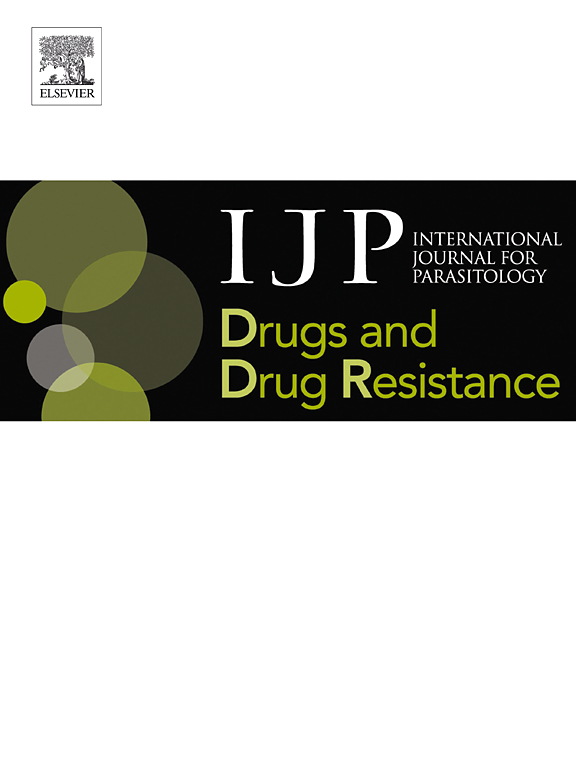Licochalcone a: A promising antiparasitic drug against giardiasis
IF 3.4
2区 医学
Q1 PARASITOLOGY
International Journal for Parasitology: Drugs and Drug Resistance
Pub Date : 2024-12-12
DOI:10.1016/j.ijpddr.2024.100573
引用次数: 0
Abstract
Giardiasis, caused by Giardia duodenalis, is a prevalent and significant zoonotic disease. While nitroimidazole drugs are primarily used to treat giardiasis, the urgent need for the development and formulation of new drugs has arisen due to increasing drug resistance. Several plant derived medicine have been employed as antiparasitic drugs. This study has evaluated the anti-Giardia effect of Licochalcone A (Lic A) through both in vitro and in vivo experiments. We determined the 50% inhibitory concentration (IC50) of Lic A, analyzed the adhesive ability of G. duodenalis, and assessed intestinal morphology and various indicators in the gerbil model. The in vitro assays demonstrated that the IC50 value of Lic A against G. duodenalis was 27.42 μM. Additionally, Lic A significantly inhibited the adhesiveability of G. duodenalis trophozoites, impairing their cell structure and cytoskeleton. In vivo experiments showed that Lic A significantly mitigated weight loss due to G. duodenalis infection, and lowered the intestinal parasite load. Histopathological examinations in gerbils indicated that Lic A could reduce intestinal damage, increase the height of intestinal villi, decrease crypt depth, and maintain the integrity of intestinal structure. Furthermore, Lic A altered cytokine levels and enhanced the body's antioxidant capacity. In conclusion, Lic A exbibits significant anti-Giardia effects both in vitro and in vivo, suggesting its potential as a promising antiparasitic drug candidate against giardiasis.

甘草查尔酮a:一种很有前途的抗贾第虫病药物。
贾第虫病由十二指肠贾第虫引起,是一种流行的重大人畜共患疾病。虽然硝基咪唑药物主要用于治疗贾第虫病,但由于耐药性增加,迫切需要开发和配制新药。几种植物源性药物已被用作抗寄生虫药物。本研究通过体外和体内实验评价了Licochalcone A (Lic A)的抗贾第鞭毛虫作用。在沙鼠模型中测定Lic A的50%抑制浓度(IC50),分析十二指肠沙鼠的粘附能力,评估肠道形态及各项指标。体外实验表明,Lic A对十二指肠巨噬菌的IC50值为27.42 μM。此外,Lic A显著抑制了十二指肠巨噬菌滋养体的粘附能力,破坏了它们的细胞结构和细胞骨架。体内实验表明,Lic A可显著减轻十二指肠螺旋体感染引起的体重下降,降低肠道寄生虫负荷。沙鼠组织病理学检查表明,Lic A能减轻肠道损伤,增加肠绒毛高度,减小隐窝深度,保持肠道结构的完整性。此外,Lic A改变了细胞因子水平,增强了身体的抗氧化能力。综上所述,Lic A在体外和体内均表现出明显的抗贾第虫作用,提示其有潜力成为一种有前景的抗贾第虫病候选药物。
本文章由计算机程序翻译,如有差异,请以英文原文为准。
求助全文
约1分钟内获得全文
求助全文
来源期刊

International Journal for Parasitology: Drugs and Drug Resistance
PARASITOLOGY-PHARMACOLOGY & PHARMACY
CiteScore
7.90
自引率
7.50%
发文量
31
审稿时长
48 days
期刊介绍:
The International Journal for Parasitology – Drugs and Drug Resistance is one of a series of specialist, open access journals launched by the International Journal for Parasitology. It publishes the results of original research in the area of anti-parasite drug identification, development and evaluation, and parasite drug resistance. The journal also covers research into natural products as anti-parasitic agents, and bioactive parasite products. Studies can be aimed at unicellular or multicellular parasites of human or veterinary importance.
 求助内容:
求助内容: 应助结果提醒方式:
应助结果提醒方式:


